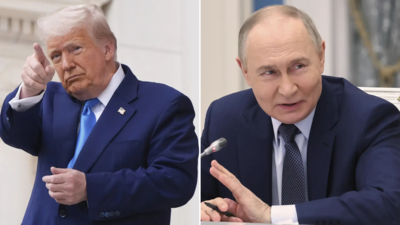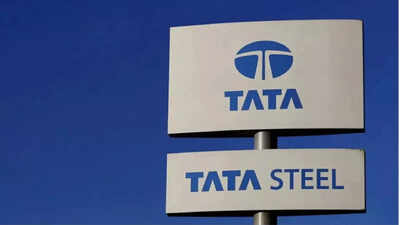Donald Trump sees ‘unlimited’ potential for ‘large-scale trade’ with Russia when ‘bloodbath is over’

[ad_1]
US President Donald Trump has put forward the possibility of resuming large-scale trade with Russia once the war in Ukraine ends, but experts say major obstacles stand in the way of such a move anytime soon.“Russia wants to do large-scale TRADE with the United States when this catastrophic bloodbath is over, and I agree,” Trump said in a statement following a phone call with Russian President Vladimir Putin. “There is a tremendous opportunity for Russia to create massive amounts of jobs and wealth. Its potential is UNLIMITED,” he added.But the ground reality paints a grim picture for the US–Russia business revival. Reasons behind:
US firms remain waryAccording to the Associated Press, since Russia’s 2022 invasion of Ukraine, hundreds of foreign companies, including major US brands like Coca-Cola, Nike, Starbucks, ExxonMobil, and Ford — have exited the country.Now, more than three years into the war Trump is suggesting that the US-Russia trade could resume if a peace deal is reached. Putin has also said that foreign companies may return “under certain conditions,” but analysts warn that the business environment has changed dramatically, and not in favor of foreign investors.Russia now classifies nations allied with Ukraine as “unfriendly states,” imposing tight restrictions on withdrawing funds and allowing the government to seize key businesses. Companies that left were often forced to sell assets at half their value or simply write them off. Some, like Danone and Carlsberg, had their assets taken over by the Russian state.Elina Ribakova, a non-resident senior fellow at Brussels-based Bruegel research institute, asserts that Russia’s policy decisions and legislative modifications have inflicted “long-lasting damage” to its commercial landscape. According to her assessment, the possibility of American companies resuming operations in Russia remains “not very likely.Political risk, legal uncertaintyWhile some companies like Renault and Ford left Russia with repurchase agreements, the Russian legal system is now considered too unstable to count on such deals. The Kremlin has signaled it intends to strengthen local companies at the expense of foreign rivals. “We need to strangle them,” Putin said recently about Western tech firms like Zoom and Microsoft that limited services in Russia.“After all, they are trying to strangle us: we need to reciprocate. We didn’t kick anyone out; we didn’t interfere with anyone. We provided the most favorable conditions possible for their work here, in our market, and they are trying to strangle us,” he added.Putin assured a representative from Vkusno-i Tochka — the Russian company that replaced McDonald’s in the country — that the government would support them if McDonald’s ever tried to buy back its old outlets. When asked for comment, McDonald’s pointed to its 2022 statement saying that continuing to operate in Russia was no longer viable, AP reported.Economic outlook dimBeyond legal uncertainty, Russia’s economy is increasingly centered on military production, with little growth expected in civilian sectors. According to the Bank of Finland, Russia faces one of the lowest projected growth rates globally.Even the lucrative oil and gas sector may not draw American firms back. ExxonMobil wrote off $3.4 billion after its stake in the Sakhalin project was terminated. And while some smaller oil service firms might be interested in returning, they’d need to meet new Russian requirements for local investment and presence.Despite sanctions, over 2,300 foreign companies still operate in Russia, mostly from China and other non-Western nations.Sanctions still a major hurdleEven if the US were to lift sanctions, EU restrictions would continue, creating compliance issues for global firms. American sanctions, which carry the risk of being shut out of the US financial system, remain the most severe deterrent.For now, Trump’s vision of a post-war trade boom with Russia appears more political narrative than business reality, at least until there’s a dramatic shift in both geopolitics and the legal environment inside Russia.
[ad_2]
Source link




